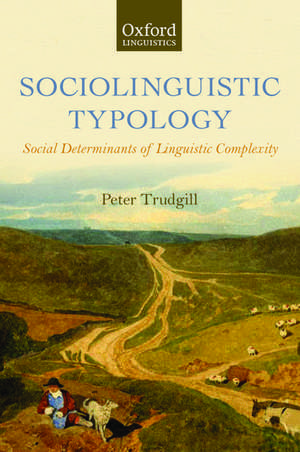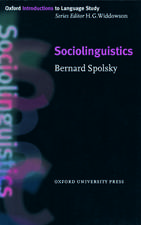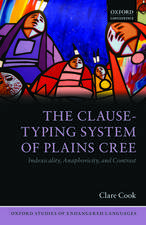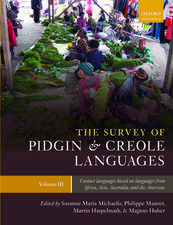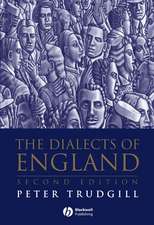Sociolinguistic Typology: Social Determinants of Linguistic Complexity
Autor Peter Trudgillen Limba Engleză Hardback – 20 oct 2011
| Toate formatele și edițiile | Preț | Express |
|---|---|---|
| Paperback (1) | 216.11 lei 31-37 zile | +155.57 lei 7-11 zile |
| Oxford University Press – 20 oct 2011 | 216.11 lei 31-37 zile | +155.57 lei 7-11 zile |
| Hardback (1) | 716.07 lei 31-37 zile | |
| OUP OXFORD – 20 oct 2011 | 716.07 lei 31-37 zile |
Preț: 716.07 lei
Preț vechi: 859.04 lei
-17% Nou
Puncte Express: 1074
Preț estimativ în valută:
137.04€ • 148.80$ • 115.11£
137.04€ • 148.80$ • 115.11£
Carte tipărită la comandă
Livrare economică 11-17 aprilie
Preluare comenzi: 021 569.72.76
Specificații
ISBN-13: 9780199604340
ISBN-10: 0199604347
Pagini: 288
Ilustrații: black & white illustrations
Dimensiuni: 164 x 240 x 21 mm
Greutate: 0.56 kg
Editura: OUP OXFORD
Colecția OUP Oxford
Locul publicării:Oxford, United Kingdom
ISBN-10: 0199604347
Pagini: 288
Ilustrații: black & white illustrations
Dimensiuni: 164 x 240 x 21 mm
Greutate: 0.56 kg
Editura: OUP OXFORD
Colecția OUP Oxford
Locul publicării:Oxford, United Kingdom
Recenzii
this thought-provoking work ... offers a fresh and compelling reason for linguists to focus on less commonly studied endangered languages. We therefore recommend this stimulating book to anyone interested in exploring possible connections between sociolinguistcs, language change, and typology.
An exciting book, multi-faceted and lucid, a book that can not only be recommended to researchers on linguistic change and historical sociolinguistics but also to advanced students in the field.
a brisk and informative introduction to a way of thinking about language that has profound implications for analysis of language diachrony, acquisition, contact, and spread - and of course, given those areas, creolization.
This bold new book, by one of the fields leading sociolinguists, outlines the need for a new intellectual project at the heart of our discipline, emphasising the crucial role of the small face-to-face societies that have shaped most of human history in generating the outer reaches of linguistic complexity.
This focussed and important work shows that degree of contact, the size of the community of speakers, and coherence within that community are all important factors in the degree to which languages become structurally simpler (losing agreement and gender for example) or more complex. This is a must-read for anyone interested in language change.
An exciting book, multi-faceted and lucid, a book that can not only be recommended to researchers on linguistic change and historical sociolinguistics but also to advanced students in the field.
a brisk and informative introduction to a way of thinking about language that has profound implications for analysis of language diachrony, acquisition, contact, and spread - and of course, given those areas, creolization.
This bold new book, by one of the fields leading sociolinguists, outlines the need for a new intellectual project at the heart of our discipline, emphasising the crucial role of the small face-to-face societies that have shaped most of human history in generating the outer reaches of linguistic complexity.
This focussed and important work shows that degree of contact, the size of the community of speakers, and coherence within that community are all important factors in the degree to which languages become structurally simpler (losing agreement and gender for example) or more complex. This is a must-read for anyone interested in language change.
Notă biografică
Peter Trudgill is Professor of Sociolinguistics at the University of Agder, Norway. He has held Chairs in Linguistics at the Universities of Reading, Essex, Lausanne, and Fribourg (where he is now Emeritus). He is also an Adjunct Professor at the Research Centre for Linguistic Typology at La Trobe University and Honorary Professor of Sociolinguistics at the University of East Anglia. His many books include Sociolinguistics: an Introduction to Language and Society (Penguin, 1974, 4th edn 2000), On Dialect (Blackwell, 1983), Dialects in Contact (Blackwell, 1986), The Dialects of England (Blackwell 1990, 2nd end 1999), New-Dialect Formation: on the Inevitability of Colonial Englishes (Edinburgh, 2004), and Investigations in Sociohistorical Linguistics: Stories of Colonisation and Contact (CUP 2010).
